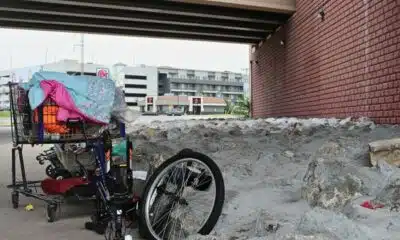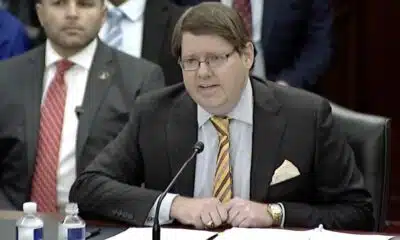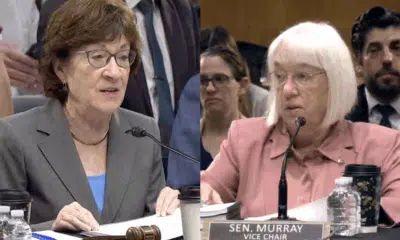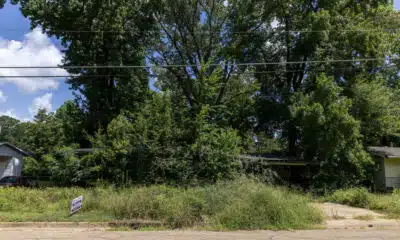News from the South - Texas News Feed
Bills filed to require generators at Texas senior facilities
After Hurricane Beryl, Texas lawmakers push for generators at senior living facilities
“After Hurricane Beryl, Texas lawmakers push for generators at senior living facilities” was first published by The Texas Tribune, a nonprofit, nonpartisan media organization that informs Texans — and engages with them — about public policy, politics, government and statewide issues.
Sign up for The Brief, The Texas Tribune’s daily newsletter that keeps readers up to speed on the most essential Texas news.
When a storm hits the Texas coast during the summer hurricane season, state Sen. Borris Miles knows among the first calls he’ll get is from a constituent letting him know power is down at an independent living complex, shutting off air conditioning for older Texans.
“‘Senator! You got these people here,’“ he said, recalling a plea from a caller when Hurricane Beryl knocked out power to an assisted living facility last summer. “‘What are we going to do?’’’
Miles, a Houston Democrat, is thankful for residents like these. But as the number of storms have increased, so has the frustration for southeast Texas lawmakers who want better solutions.
That’s why Miles and four other coastal lawmakers have filed at least six bills that would require nursing homes, assisted living facilities and even some apartments that market to the 55 and older set, to have emergency generators on site. In Texas, there are 1,193 nursing homes serving more than 86,000 patients and 2,004 assisted living facilities housing 49,574 residents.
Miles’ Senate Bill 732 would require certain low-income housing for seniors living independently to have backup power. In recent years, Miles has seen more of these facilities being built in Houston. Often living in multistory apartment buildings, residents of this type of housing do not receive care, so little information, including on their health conditions, are collected. But after a storm knocks out power, the vulnerable conditions of these residents surface, as some in wheelchairs and walkers become trapped in elevators that are inoperable, Miles said.
“We need to take care of people,” he said.
SB 481 from state Sen. Carol Alvarado, D-Houston would require emergency plans at nursing homes and assisted living facilities to include generators. Nursing homes, which as the name suggests, offer more intense medical support to patients compared to assisted living facilities, which are senior apartments that provide meals and some assistance to its residents. HB 1199 by Rep. Christian Manuel, D-Beaumont, calls for emergency generators that have the capacity to run for a minimum of 72 hours in such facilities.
“Texans know firsthand the impact of being without power, particularly in elder care facilities where the stakes are incredibly high,” Manuel said in a statement.
Rep. Suleman Lalani, D-Sugar Land, has filed HB 1467 that would require nursing homes, assisted living and independent housing for seniors to have generators. Another one of his bills, HB 863, would create a shared database of where senior independent living communities are and include each complex’s emergency plan, which is required by the state for assisted living and nursing homes. The database would be accessible to emergency response officials.
“Things happen and then people make noise and then people go quiet,” he said, remarking on past failed attempts to get a generator bill passed. “I think I have a unique opportunity and responsibility being a physician…I cannot go back and say ‘Oh,’ I will let it go.”
History of generator bills and pushback
In this century alone, Texans have seen damage and death from hurricanes Rita in 2005, Ike in 2008, Harvey in 2017 and last July’s Beryl, not to mention more freak storms like Uri’s freeze in 2021 and last year’s wildfires in the Panhandle and a windstorm in the Houston area. All have taken the power down for hours, days and in the case of Beryl, weeks.
Former state Rep. Ed Thompson of Pearland became a champion for senior facility residents following a simple spring storm in 2018 that caused a power outage in his district.
After arriving to check on a nearby senior facility, he was stunned to find an ill-prepared staff. Residents had been in a hot and dark facility for hours. When he asked a worker about the facility’s emergency plan, he was incensed that it relied mostly on calling families to pick up their relatives or for those who had no family, just sending them to the local emergency rooms.
“That lit a fire in me,” he told the Tribune last week.
Calls for generators to be required equipment, particularly at assisted living facilities, are nothing new, but bills in the last two legislative sessions have died, including Thompson’s in 2023. His legislation stalled in committee after facing opposition from the nursing care and assisted living industries, which raised concerns, mostly about generator’ costs, which is estimated to be at least $200,000 or more for a facility.
That’s why this session, Rep. Ana Hernandez, D-Houston, has filed HB 2224 which would require backup power for elevators for 48 hours after a power loss. “A significant reduction in cost,” she said. Past bills that have failed, she said, have focused on keeping the entire facility powered.
“It is inhumane to leave an elderly person abandoned without electricity in temperatures over 100 degrees for days, or even weeks,” Hernandez said. “Not having at least one elevator poses a high safety risk of elderly people being trapped on upper-level floors, prohibiting residents from escaping a fire or seeking medical care.”
It’s not clear whether the smaller price tag on such a requirement will get the buy-in of the influential long-term care industry.
The Texas Health Care Association, now headed by former state Sen. Travis Clardy, represents most of the state’s nursing homes and he says his members already have generators but any blanket requirement for equipment that has to be purchased and maintained, perhaps once every few years, is a costly state mandate.
“I think our membership would prefer to be able to see that channeled into higher quality care,” Clardy said.
Requirements during a storm
When a storm heads for Texas, the state Health and Human Services Commission sends out emergency alerts to providers, putting them on notice that their emergency plans should be ready for use in case of a loss of power. The agency also contacts the facilities directly to check on the health and safety status of residents.
Last year, some 80 long-term care facilities were without power three days after Hurricane Beryl made landfall on July 8. According to the agency, both assisted living facilities and nursing homes are always responsible for the safety of residents including during a storm.
Emergency preparedness plans, which all assisted living and nursing home facilities must have, include a list of contacts workers will call in the event of a power outage and how they will evacuate residents if they need to do so.
Since 1996, state law has required all new nursing homes to have an emergency generator that powers safety features such as emergency lighting and exit signs, fire alarm systems, nurse call systems, telephones and medication and life-saving equipment. Assisted living facilities are not required to have a generator.
That said many assisted living facilities have some type of power back up to keep food or medications refrigerated. But cooling and heating all living areas is not something that has been explicitly required for assisted living facilities or nursing homes.
Since 2016, federal law requires generators in nursing homes in new and replacement nursing homes or for all nursing homes that have indicated in their emergency plans they would rely on emergency power to provide heating and cooling or other critical systems.
However, the agency does not regulate other types of housing such as independent, senior, or congregant living facilities. These entities do not hold a state license and are not required to report any information to the state health agency.
Carmen Tilton, vice president of public policy for the Texas Assisted Living Association said her industry has been a willing collaborative partner with lawmakers on the issue of requiring generators.
After Hurricane Harvey, her organization worked with the state to to hammer out a regulation that requires facilities to keep temperatures inside no colder than 68 degrees and no hotter than 82.
“The state doesn’t say you have to check a box,” she said.
The agency leaves it to industry to determine how they will meet that standard. It could be cooling one room inside a facility with fans and portable generators and bringing residents into that one room or if assisted living facilities wanted to purchase and maintain a larger generator, they can do so without the state determining the size, or how much fuel to keep on hand at all times.
That flexibility is what the assisted living industry wants to keep in place, Tilton said.
“We recognize that everyone’s set-up is a little bit different,” she said. “We’re not fighting these bills. We’re trying to find out how to make them work under our existing regulations.”
AARP Texas, which is advocating for generators in assisted living facilities, wants more clarity in law, not just in the administrative code. The code is too often and too easily changed, said Andrea Earl, an associate state director of advocacy and outreach at AARP Texas.
“There’s no assurances in law that healthy temperatures will be maintained at all times in the residential spaces of Texas’ long-term care facilities,” she said.
Some local governments are not waiting on the legislature to act. Earlier this month, Harris County announced it was incorporating into its fire code a requirement for generators for all nursing homes and assisted living facilities located in unincorporated areas.
There’s already been pushback.
“The new mandate is problematic in many ways and would needlessly require communities to reconfigure existing systems,” said Diana Martinez, the assisted living association’s president and CEO, in a statement. “Generators are not a one-time expenditure nor are they a panacea. Generators do fail.”
Disclosure: AARP Texas and Texas Health Care Association have been financial supporters of The Texas Tribune, a nonprofit, nonpartisan news organization that is funded in part by donations from members, foundations and corporate sponsors. Financial supporters play no role in the Tribune’s journalism. Find a complete list of them here.
This article originally appeared in The Texas Tribune at https://www.texastribune.org/2025/02/03/texas-seniors-assisted-living-nursing-homes-generators/.
The Texas Tribune is a member-supported, nonpartisan newsroom informing and engaging Texans on state politics and policy. Learn more at texastribune.org.
News from the South - Texas News Feed
City provides update on construction of Emma S. Barrientos Mexican American Cultural Center
SUMMARY: The City of Austin is advancing Phase 2 of the Emma S. Barrientos Mexican American Cultural Center (ESB MACC) project, which began construction in August 2023 near Lady Bird Lake. Dedicated to preserving and promoting Mexican American and Latino arts and heritage, the center aims for substantial completion by late summer 2025, with a grand reopening planned for November 1. Progress includes installing classroom partitions, cabinetry, windows, and doors, with ongoing work on paving, landscaping, and lighting. Nearby, the Confluence project has increased traffic and trail detours around the center, prompting the city to advise caution in the area.
The post City provides update on construction of Emma S. Barrientos Mexican American Cultural Center appeared first on www.kxan.com
News from the South - Texas News Feed
U.S.-Mexico Border Militarization Fails to Stop Modern Drug Smuggling Industry
Just across the Texas border, in cities like Reynosa and Nuevo Laredo, criminal networks are strengthening their hold on drug routes despite increased enforcement efforts by the United States and Mexico.
Rather than rely on individual smugglers crossing unmanned sections of the border, cartels specializing in fentanyl and other synthetic drugs use legal ports of entry, commercial vehicles, and digital payment systems to move drugs and launder profits with less risk, according to federal drug enforcement data and Texas Observer interviews with experts on cartel operations.
The tactics may be more modern, but the result is the same. Criminal networks are adapting faster than government policy. The drug war is less centered on tunnels or border fences and more on encrypted communication, synthetic chemicals, and financial systems that remain poorly regulated. Despite billions spent on enforcement, U.S. efforts often fail to match the pace of complexity of the trade, Guadalupe Correa-Cabrera, co-director of the Terrorism, Transnational Crime and Corruption Center (TraCCC) at George Mason University told the Observer.
“To sell more products, you have to go online,” Correa-Cabrera said. “And you keep anonymity by going online.”
She emphasized that many dealers are not Mexican cartel bosses, but United States-based players using American platforms. “They specialize. Some people produce. Some transport. Others connect dealers with larger distributors. That’s what’s missing from the public’s understanding.”

In February 2025, Mexican President Claudia Sheinbaum deployed more than 10,000 soldiers to her country’s northern border under Operación Frontera Norte in response to tariff threats by the Trump administration. Officials announced a sweeping crackdown to stem the flow of fentanyl into the United States. By June, Mexican authorities had reported seizing nearly 70,000 pounds of drugs, including 392 pounds of fentanyl.
Sheinbaum hailed the operation’s success in recent press conferences. “The reduction of fentanyl, or the passage of fentanyl from Mexico to the United States has fallen in a very dramatic way. Since Trump entered government to the present, the reduction is about 40 percent,” she said in June.
Administration officials at the Drug Enforcement Agency and U.S. Immigration and Customs Enforcement (ICE) failed to respond to requests for comment from the Medill News Service and the Texas Observer on those numbers.
But Correa-Cabrera questioned the effectiveness of such deployments. “We don’t really know if it’s really working,” she said. “When you use the military or police to enforce drug policy, they often become involved themselves.
In the past, large-scale narcotics enforcement focused on plant-based drugs like cocaine, heroin, and marijuana—substances that all require space, time, and risk to grow, dry, pack, and transport. Fentanyl changed that.
Just two milligrams of fentanyl can be fatal. One year’s supply of fentanyl for the entire U.S. market can fit in less than three pickup trucks. This makes fentanyl more difficult to track than other drugs.
Neither government is going after the roots of the synthetic drug problems, Correa-Cabrera said. “The U.S. and Mexican governments keep going after cartel members instead of dismantling the full networks—the financial flows, arms trafficking, addiction, corruption,” Correa-Cabrera added. “
In the Mexican state of Sinaloa, the historical epicenter of synthetic drug production, fragmentation of leadership within the Sinaloa Cartel has disrupted how the group functions. The sons of Joaquín “El Chapo” Guzmán, known as Los Chapitos, have come under pressure from rival factions and government raids. What was once a consolidated industrial drug empire is now fracturing into competing fiefdoms.
Border experts say this disruption has prompted a broader shift, as powerful groups take or retake control of key corridors and push out smaller traffickers through violence, extortion, or forced cooperation.
Cartel Jalisco Nueva Generación (CJNG)—Sinaloa’s top rival—has capitalized on the chaos. DEA reports indicate that CJNG now controls major seaports in Mexico and has built a robust supply chain into U.S. cities including Los Angeles, Houston, and Atlanta. At the same time, dozens of smaller groups have formed regional alliances or branched off to run micro-operations.
“The narrative has overly focused on cartels as these very solid structures,” said Victoria Dittmar, an investigative journalist with InSight Crime. “What we need to understand is that these structures are more fluid and very adaptable.”
Adam Isacson is director for defense oversight at the Washington Office on Latin America, an organization that advocates for U.S. and regional policies that strengthen institutions’ ability to protect people facing insecurity, corruption, and violence, including those impacted by transnational criminal organizations and the illicit drug trade. While he knows about
about Mexico’s announcements about major drug seizures, he says those efforts haven’t really slowed the overall drug flow across the border.
“Looking at 2024 to now, we’re not seeing a major change in drug seizure patterns anywhere along the border,” Isacson said in an interview. Drug traffickers appear to have adapted, including in how they get drugs across the border, he added. “You don’t send a migrant who you don’t even know or trust with a backpack full of something very small and very high-value, like fentanyl.”
Instead, cartels rely on vehicles, and often U.S. citizens, to carry the product through official ports of entry. According to U.S. Customs and Border Protection, more than 80 percent of fentanyl seizures occur at vehicle crossings. That’s not the terrain where most Border Patrol officers are stationed. “That is more of a job not for Border Patrol, but for the guys in the blue uniforms who are sitting in the booths all day and inspect cars,” Isacson added.
Despite evidence that most smuggling happens through legal crossings, the Trump administration has responded with a sweeping political maneuver: a January 2025 executive order designating several Mexican cartels as foreign terrorist organizations.That move places them in the same legal category as Al-Qaeda and the Islamic State, and it also authorizes broader surveillance, asset seizure, and use of military intelligence assets against major cartel groups.
The U.S. Coast Guard has already stepped up its operations at sea in response. “The Coast Guard has surged assets and tripled our operational presence to continue to secure America’s maritime borders, territorial integrity, and sovereignty,” said Lieutenant Commander Steve Roth, Chief of Media Relations for the U.S. Coast Guard in an email statement to the Observer and the Medill News Service.
Admiral Kevin Lunday, acting commandant of the Coast Guard, said in the same statement, “As illegal crossings and smuggling become harder across the southwest land border, cartels may try different routes.” He added, “Our message to the cartels is this: ‘We own the sea, not you. We will find you out there, and we will take you down before you reach our border.’”
But critics argue that the move to label cartels as terrorist organizations is inaccurate and dangerous.
Oswaldo Zavala, a professor of Latin American studies at the City University of New York and author of Drug Cartels Do Not Exist, sees the designation as a political branding exercise that risks deepening conflict without addressing root causes.
“We focus on Mexico because there’s a political motivator to do so,” he said. “It’s a vicious cycle that increases spending at the U.S.–Mexico border. It criminalizes just Mexico.”
He warned that the policy is already shaping discourse in Mexico, with unintended consequences. “This mobilizes new aggressive military policies,” Zavala said. “It has permitted the debate in Mexico because now we have people on the right in Mexico pushing for the same agenda of thinking of cartels as narco-terrorist organizations.”
Ultimately, Zavala argued, the most urgent failures are domestic. “If we’re really honest about understanding and fighting criminality at this level,” Zavala added, “the U.S. needs to look at its own institutions, its own corruption, and its own process for facilitating this.”
Some experts argue the real battle lies much farther south than the Texas-Mexico border. Isacson, for one, argues that whatever is done “at the northern border is too late,” Isacson said. “It’s all for show, to be seen in a visible way.”
“If you’re really trying to do interdiction, you’d be working on the [Mexican] ports of entry with the precursor chemicals coming in … and you’d be working on other road checkpoints and known corridors further south, closer to the labs, rather than just 20 miles from the [U.S.] border,” he said.
Much of the fentanyl production pipeline is far away from the U.S.-Mexico border. China plays a critical role as a supplier of precursor chemicals used by cartels to manufacture synthetic opioids.
According to a February 2025 White House proclamation, the Chinese Communist Party has “failed to meaningfully curb” the export of precursor chemicals despite years of international pressure. The United States has since imposed duties on certain Chinese goods to address what it describes as systemic support of this supply chain. In August 2024, ICE announced the indictment of Xuening Gao and two other senior leaders of Hubei Aoks Bio‑Tech Co., a Chinese chemical manufacturer.
The company was charged with knowingly producing and distributing the chemical building blocks used to manufacture fentanyl in Mexico. Investigators found that Hubei Aoks openly marketed its fentanyl precursors online and shipped mislabeled products to Mexico to evade law enforcement. ICE’s Homeland Security Investigations and the DEA linked the company directly to Mexican labs affiliated with transnational criminal networks.
Reporting by NPR has shown that Chinese chemical companies often exploit legal gray zones and loosely regulated supply chains to ship massive quantities of precursor materials across the Pacific. Once in Mexico, these chemicals are refined into fentanyl and distributed across the United States with relative ease.
This offshore manufacturing and transport network has made it difficult for both Mexican and U.S. authorities to contain production. It also underscores the limitations of policies that focus more on terrestrial border enforcement.
Meanwhile, overdoses continue. According to the CDC and DEA, nearly 75,000 people died of synthetic opioid overdoses in 2023.

Jaime Puerta, a California-based Marine Corps veteran and founder of VOID (Victims of Illicit Drugs), lost his son Daniel in 2020 to a counterfeit pill sold on Snapchat. Daniel, who also lived in California, thought he was taking a pharmaceutical painkiller. It was laced with fentanyl. “Due to the drastic reduction of illicit fentanyl coming in a pill form through the border, the cartels are sending in the actual powder, and the pills are being produced here in the United States,” Puerta said.
Puerta and other advocates have pushed for tougher federal laws on precursor chemicals and greater liability for social media platforms used to advertise and sell fentanyl.
Once drugs are sold, proceeds must be moved, and cartels have adopted more sophisticated methods of hiding their assets. According to a June 2024 advisory from FinCEN, traffickers increasingly use Chinese underground banking networks, shell companies, and cryptocurrency platforms to hide revenue.
For example, a trafficker in McAllen can sell fentanyl pills locally, use a digital payment system to route funds through a fake import/export business, and have the money reappear in Mexico or China the next day. U.S. law enforcement rarely intercepts it.
The DEA has launched multiple operations targeting digital laundering, including Operation Last Mile in 2023, which identified over 1,100 social media-linked distribution networks operating across all 50 states. But it’s unclear if that effort has been sustained.
And fentanyl isn’t everything. Xylazine, a veterinary sedative, now appears in over half of the fentanyl samples seized in U.S. cities, complicating overdose treatment and tracking efforts.
Isacson warns the U.S. is at risk of repeating its mistakes. “There was a shift between 2017 and 2018 from heroin and cocaine to fentanyl during the first Trump administration,” he said. “The DEA was not paying attention and had no motivation to get new machinery installed to detect the small doses of drugs.”
He fears something similar may now be happening with Xylazine. “They missed the mark then and could miss it again now by only focusing on fentanyl,” he said.
The post U.S.-Mexico Border Militarization Fails to Stop Modern Drug Smuggling Industry appeared first on www.texasobserver.org
Note: The following A.I. based commentary is not part of the original article, reproduced above, but is offered in the hopes that it will promote greater media literacy and critical thinking, by making any potential bias more visible to the reader –Staff Editor.
Political Bias Rating: Center-Left
This article presents a detailed critique of current U.S. and Mexican policies addressing fentanyl trafficking and drug enforcement. It highlights the limitations and failures of militarized and enforcement-heavy approaches, while emphasizing the complexity of the drug networks, including financial, technological, and systemic factors often overlooked by mainstream narratives. The piece is critical of right-leaning policies such as the Trump administration’s designation of cartels as terrorist organizations and points to broader institutional and societal issues, aligning with perspectives common in Center-Left discourse that favor nuanced, systemic analysis over punitive, militarized responses. The tone is investigative and policy-focused without strong partisan rhetoric, but the emphasis on criticizing conservative policy actions and calling for more comprehensive domestic and international solutions nudges it toward a Center-Left bias.
News from the South - Texas News Feed
Last Coast Guard report of deadly OceanGate submersible
SUMMARY: The final Coast Guard report on the deadly OceanGate Titan submersible implosion concludes the tragedy was preventable. Over two years ago, five people died while exploring the Titanic wreck. The report places much blame on OceanGate CEO Stockton Rush, who piloted the submersible and could have faced manslaughter charges if alive. Failures included ignoring engineering, testing, and safety protocols, amid a toxic workplace where whistleblowers were fired. Unlike previous models, Titan’s carbon fiber hull was improperly inspected after incidents compromised its integrity. Lack of regulation and oversight also contributed, with OceanGate failing to register the vessel properly.
Two years after five people died on a failed expedition to view the titanic wreckage, the coast guard says it all could have been prevented. Much of the blame is put on OceanGate CEO Stockton Rush, who piloted the doomed titan submersible. The report says Rush could have been investigated for manslaughter if he had survived.
Subscribe to FOX 4: https://www.youtube.com/fox4news?sub_confirmation=1
Dallas news, weather, sports and traffic from KDFW FOX 4, serving Dallas-Fort Worth, North Texas and the state of Texas.
Download the FOX LOCAL app: fox4news.com/foxlocal
Watch FOX 4 Live: https://www.fox4news.com/live
Download the FOX 4 News App: https://www.fox4news.com/apps
Download the FOX 4 WAPP: https://www.fox4news.com/apps
Follow FOX 4 on Facebook: https://www.facebook.com/Fox4DFW/
Follow FOX 4 on Twitter: https://twitter.com/FOX4
Follow FOX 4 on Instagram: https://www.instagram.com/fox4news/
Subscribe to the FOX 4 newsletter: https://www.fox4news.com/newsletters
-
News from the South - Texas News Feed6 days ago
Rural Texas uses THC for health and economy
-
Mississippi Today2 days ago
After 30 years in prison, Mississippi woman dies from cancer she says was preventable
-
News from the South - Alabama News Feed6 days ago
Decision to unfreeze migrant education money comes too late for some kids
-
News from the South - Louisiana News Feed7 days ago
‘Half-baked’ USDA relocation irritates members of both parties on Senate Ag panel
-
News from the South - Georgia News Feed4 days ago
Woman charged after boy in state’s custody dies in hot car
-
News from the South - Arkansas News Feed6 days ago
Trump’s big proposed cuts to health and education spending rebuffed by US Senate panel
-
Mississippi Today6 days ago
They own the house. Why won’t they cut the grass?
-
News from the South - Georgia News Feed7 days ago
Bookman: Burt Jones’ pledge to eliminate Georgia’s income tax is wrong-headed











































